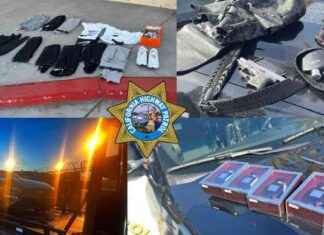In Nigeria, at least 55 people were killed in two new attacks, Tuesday January 23 and Wednesday January 24, in Plateau State (center), scene of deadly intercommunal violence since Christmas, we learned Thursday from sources local authorities of the Nigerian Red Cross. Despite a curfew imposed on Tuesday in Mangu district, schools, places of worship and homes were burned and ransacked in both attacks, community leaders said.
The Mwaghavul Development Association, an organization bringing together members of the Mwaghavul (predominantly Christian) ethnic group, accused Fulani (Fulani) Muslim herders of attacking the village of Kwahaslalek and killing “around 30 people”. This report was confirmed to AFP by a local relief official and a humanitarian source on the ground, on condition of anonymity.
“Two IDP camps have been set up in the town of Mangu, for around 1,500 people,” Nurudeen Husaini Magaji, local president of the Nigerian Red Cross, told AFP. The governor of Plateau announced a curfew on Tuesday after a new clash sparked, according to the authorities, by a dispute between a breeder moving his cattle and other residents using the road.
The second attack took place in the town of Mangu, also between Tuesday and Wednesday. Jama’atu Nasril Islam (JNI), a Muslim community organization, said religious places of worship and schools had been attacked.
“We found 25 corpses, we are waiting for the protection of the security forces to bury them,” Jafaru Musa, one of the local JNI leaders, told AFP. “Several of our people were killed,” he said after the discovery of lifeless bodies in a mosque, which has since been secured by the army: “We are continuing our search with the support of the Red Cross to see if we can still find any dead people, because a lot of people are missing. “.
Seventeen people arrested
Spokespersons for the police and army did not respond to AFP’s requests for confirmation. Police presented to journalists 17 arrested people, whom they accuse of taking part in attacks over the Christmas period and other recent violence in the area. “The area remains highly secured by security forces,” Deputy Inspector General Ebong Eyibio assured journalists. “Everything is calm now, the military is everywhere,” said Yusuf Abdullashi, a resident of Mangu.
Plateau State, located on the dividing line between the north of Nigeria, which is predominantly Muslim, and the south, which is predominantly Christian, is a hotbed of intercommunal violence. Tensions have soared since nearly 200 people were killed over Christmas in raids on predominantly Christian villages.
The clashes in the northern and central states of Nigeria are fueled by community tensions linked to land use between nomadic herders and sedentary farmers. But these types of attacks have degenerated into broader criminality. Heavily armed gangs, known locally as “bandits,” attack villages, pillaging and kidnapping for ransoms.
At Christmas, attacks affected around twenty villages in the districts of Bokkos and Barkin Ladi, neighboring that of Mangu. These massacres caused turmoil in the country, but also within the international community. Since then, recurring attacks have taken place in the region, causing the displacement of thousands of people.
Since coming to power in May, President Bola Ahmed Tinubu has made the fight against insecurity his priority, particularly with a view to attracting foreign investment to the country.





